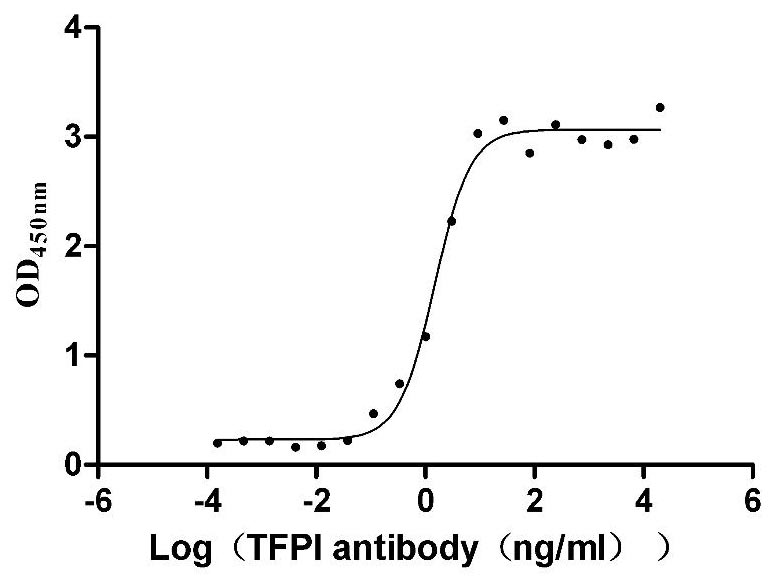Recombinant Human Metalloreductase STEAP1 (STEAP1), partial
-
中文名稱:人STEAP1重組蛋白
-
貨號:CSB-YP890691HU1
-
規(guī)格:
-
來源:Yeast
-
其他:
-
中文名稱:人STEAP1重組蛋白
-
貨號:CSB-EP890691HU1-B
-
規(guī)格:
-
來源:E.coli
-
共軛:Avi-tag Biotinylated
E. coli biotin ligase (BirA) is highly specific in covalently attaching biotin to the 15 amino acid AviTag peptide. This recombinant protein was biotinylated in vivo by AviTag-BirA technology, which method is BriA catalyzes amide linkage between the biotin and the specific lysine of the AviTag.
-
其他:
-
中文名稱:人STEAP1重組蛋白
-
貨號:CSB-BP890691HU
-
規(guī)格:
-
來源:Baculovirus
-
其他:
產(chǎn)品詳情
-
純度:>85% (SDS-PAGE)
-
基因名:
-
Uniprot No.:
-
別名:STEAP1; PRSS24; STEAP; Metalloreductase STEAP1; Six-transmembrane epithelial antigen of prostate 1
-
種屬:Homo sapiens (Human)
-
蛋白長度:Partial
-
蛋白標簽:Tag?type?will?be?determined?during?the?manufacturing?process.
The tag type will be determined during production process. If you have specified tag type, please tell us and we will develop the specified tag preferentially. -
產(chǎn)品提供形式:Lyophilized powder
Note: We will preferentially ship the format that we have in stock, however, if you have any special requirement for the format, please remark your requirement when placing the order, we will prepare according to your demand. -
復溶:We recommend that this vial be briefly centrifuged prior to opening to bring the contents to the bottom. Please reconstitute protein in deionized sterile water to a concentration of 0.1-1.0 mg/mL.We recommend to add 5-50% of glycerol (final concentration) and aliquot for long-term storage at -20℃/-80℃. Our default final concentration of glycerol is 50%. Customers could use it as reference.
-
儲存條件:Store at -20°C/-80°C upon receipt, aliquoting is necessary for mutiple use. Avoid repeated freeze-thaw cycles.
-
保質(zhì)期:The shelf life is related to many factors, storage state, buffer ingredients, storage temperature and the stability of the protein itself.
Generally, the shelf life of liquid form is 6 months at -20°C/-80°C. The shelf life of lyophilized form is 12 months at -20°C/-80°C. -
貨期:Delivery time may differ from different purchasing way or location, please kindly consult your local distributors for specific delivery time.Note: All of our proteins are default shipped with normal blue ice packs, if you request to ship with dry ice, please communicate with us in advance and extra fees will be charged.
-
注意事項:Repeated freezing and thawing is not recommended. Store working aliquots at 4°C for up to one week.
-
Datasheet :Please contact us to get it.
相關產(chǎn)品
靶點詳情
-
功能:Metalloreductase that has the ability to reduce both Fe(3+) to Fe(2+) and Cu(2+) to Cu(1+). Uses NAD(+) as acceptor.
-
基因功能參考文獻:
- High STEAP1 expression is associated with prostate cancer. PMID: 29464393
- Data suggest a solid basis for further research into understanding how six-transmembrane epithelial antigen of prostate member 1 (STEAP1) activities may affect cancer progression. PMID: 27792302
- These findings highlight the ability of immuno-PET with (89)Zr-2109A to detect acute changes in STEAP1 expression PMID: 25453051
- Data indicate that six transmembrane epithelial antigen of the prostate 1 (STEAP1) is consistently overexpressed in malignant prostate tissue, namely adenocarcinoma and prostatic intraepithelial neoplasia (PIN) lesions. PMID: 24239460
- The findings provide evidence that STEAP1 is a biomarker of worse prognosis in prostate carcinomas patients. PMID: 24025158
- STEAP1 is down-regulated by dihydrotestosterone and estradiols in LNCaP cells and in rat prostate. PMID: 23060075
- A total of 62.3% of the Ewing's Sarcoma samples displayed detectable STEAP1 expression with predominant localization of the protein at the plasma membrane. PMID: 22317770
- STEAP1 is associated with the invasive behavior and oxidative stress phenotype of Ewing tumors, an unanticipated oncogenic function of STEAP1. PMID: 22080479
- STEAP1 overexpression predicts improved outcome of Ewing's sarcoma patients, possibly due to enhanced sensitivity towards ROS-generating chemotherapeutics. PMID: 22317770
- EWS-FLI1 mediated overexpression of STEAP1 increases the invasiveness and oxidative stress levels of Ewing tumor cells. PMID: 22080479
- Data suggest that zoledronic acid may affect cancer cells also by targeting the gene expression of STEAP. PMID: 19915386
- Peptide STEAP-292.2L (MLAVFLPIV) may have potential as an antitumor peptide vaccine. PMID: 15958640
- STEAP mRNA is used here as a marker to evaluate biological samples from individuals suspected of having cancers, and may provide prognostic information useful in defining appropriate therapeutic options. PMID: 18793824
- STEAP1 is over-expressed in breast cancer and down-regulated by 17beta-estradiol. PMID: 18958632
- STEAPs may represent novel markers of mesenchymal stem cells in man as well as mice. PMID: 19196137
顯示更多
收起更多
-
亞細胞定位:Endosome membrane; Multi-pass membrane protein.
-
蛋白家族:STEAP family
-
組織特異性:Ubiquitously expressed. Highly expressed in prostate tumors.
-
數(shù)據(jù)庫鏈接:
Most popular with customers
-
Recombinant Human Tumor necrosis factor ligand superfamily member 9 (TNFSF9), partial (Active)
Express system: Mammalian cell
Species: Homo sapiens (Human)
-
Recombinant Human Tissue factor pathway inhibitor (TFPI), partial (Active)
Express system: Mammalian cell
Species: Homo sapiens (Human)
-
Recombinant Dog Angiopoietin-2 (ANGPT2) (Active)
Express system: Mammalian cell
Species: Canis lupus familiaris (Dog) (Canis familiaris)
-
Recombinant Human Cannabinoid receptor 1 (CNR1)-VLPs (Active)
Express system: Mammalian cell
Species: Homo sapiens (Human)
-
Recombinant Human Cell adhesion molecule 1 (CADM1), partial (Active)
Express system: Mammalian cell
Species: Homo sapiens (Human)
-
Recombinant Mouse CUB domain-containing protein 1 (Cdcp1), partial (Active)
Express system: Mammalian cell
Species: Mus musculus (Mouse)
-
Recombinant Mouse Cytotoxic and regulatory T-cell molecule (Crtam), partial (Active)
Express system: Mammalian cell
Species: Mus musculus (Mouse)
-
Recombinant Human Myosin regulatory light chain 12A (MYL12A) (Active)
Express system: E.coli
Species: Homo sapiens (Human)




















